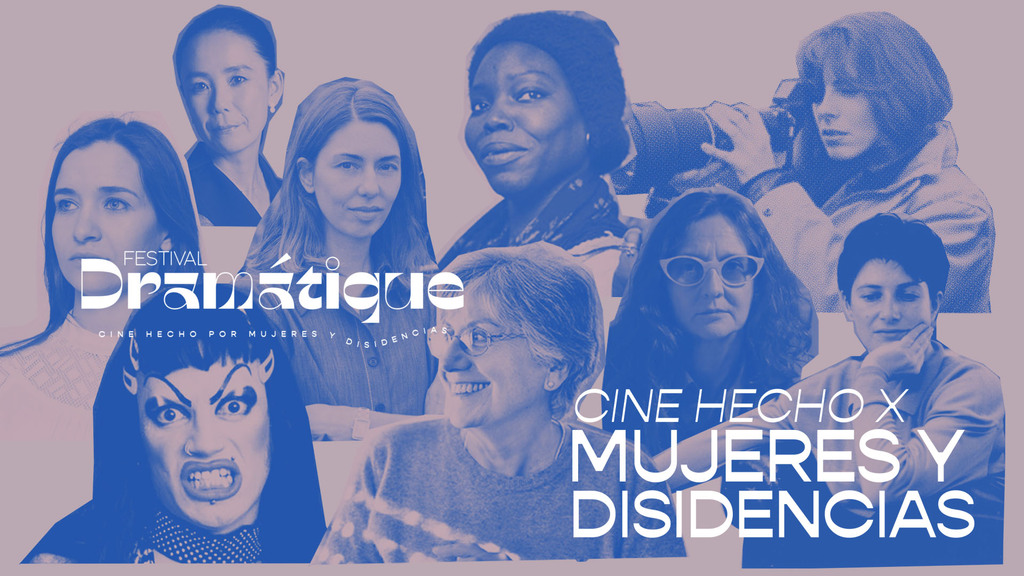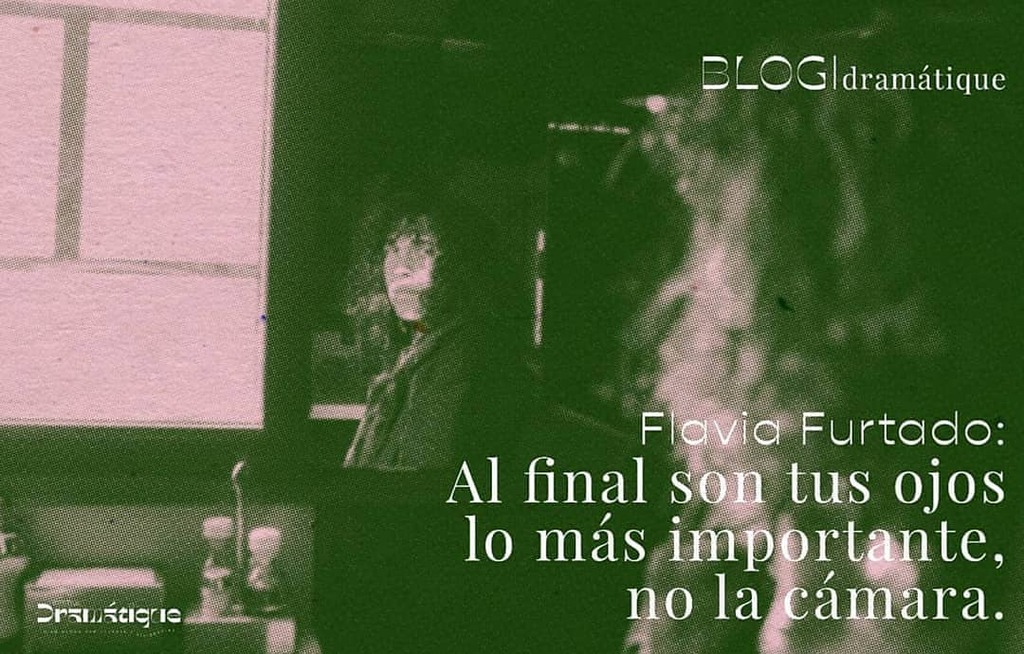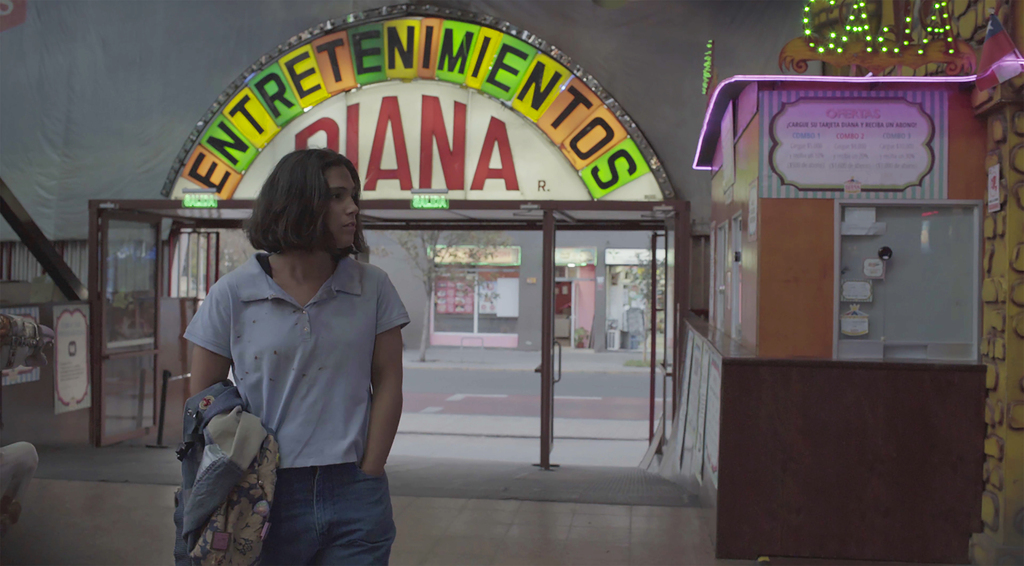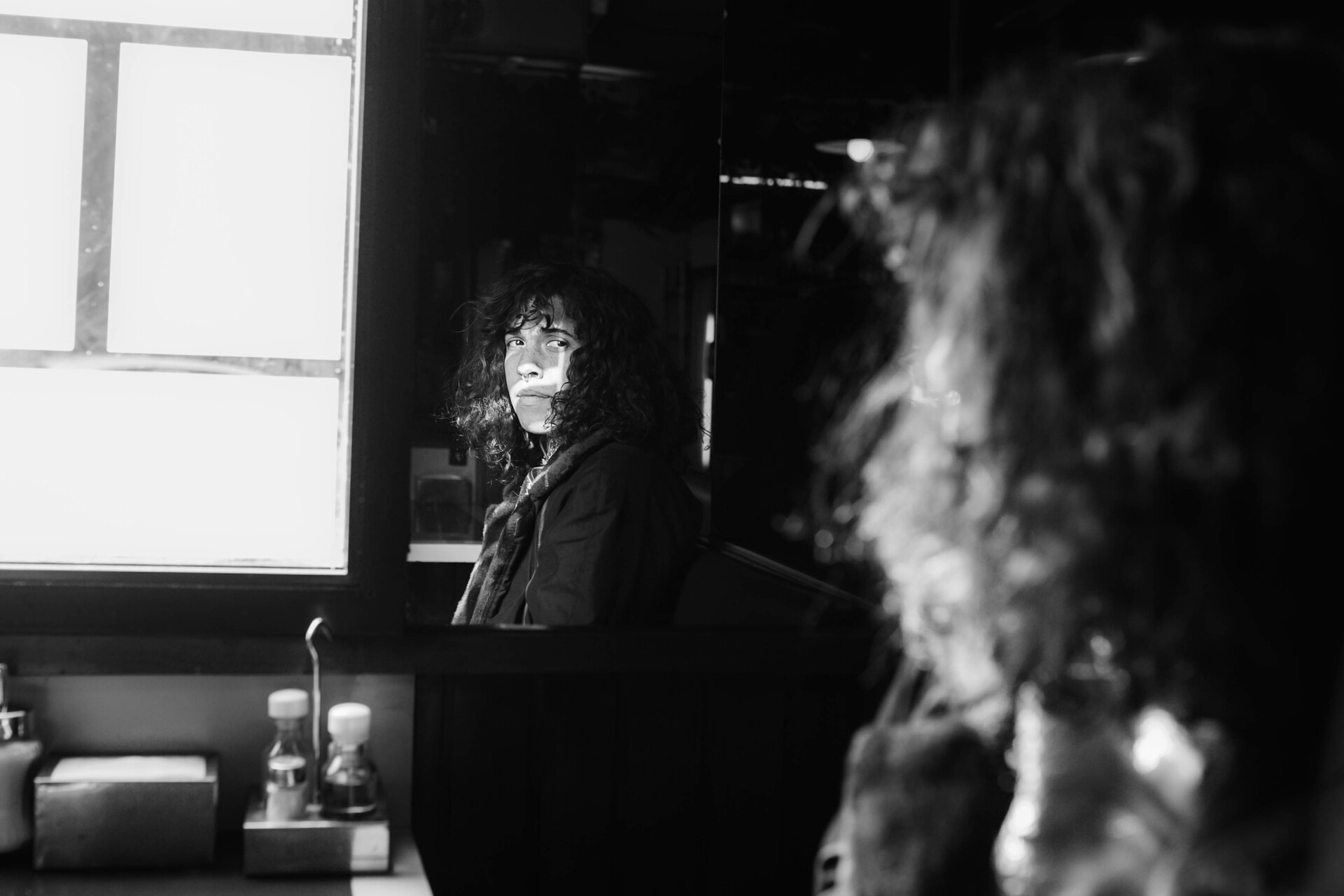

Dramatique film festival enterview by Masiel Soler-Urzúa (eNGLOSH BELOW)
Entrevista de flavia Furtado para el Festival de cine de mujeres y personas lgbt "Dramatique" por Masiel Soler-Urzúa
¿Cuándo y por qué te comenzó a interesar el cine?
El cine siempre me ha apasionado, desde que tengo memoria. En gran medida fue influencia de mi papá que habitualmente arrendaba películas en videoclubs. Siendo muy chica me la pasaba frente a la tele y ya había visto un montón de películas, me maravillaba tremendamente la capacidad del cine de contar historias y crear universos inexistentes. Hace un tiempo entre despierta y dormida logré llegar a un estado de conciencia muy particular, al que no he logrado volver, pero en esa ocasión tuve una visión en la que yo era un chico en europa del siglo XIX y miraba como un adulto (supongo mi papá) revisaba película de celuloide a la luz. Fue una visión muy corta y no era un sueño, en ese momento sentí que era una imagen de otra vida, un recuerdo recóndito en mi memoria. Ahora pensando mucho en eso, creo que quizás desde ahí viene mi interés por el cine, siempre lo he sentido como intrínseco y cercano.
¿Cómo definirías tu estilo de arte? ¿cuales son tus referentes?
Es difícil para mi encasillar lo que hago en un estilo, pero desde que empecé a escribir, dirigir y montar obras audiovisuales que intento estudiar la conciencia a través de ellas, de la imagen. Podría definir mi estilo como onírico quizás. De alguna manera termino siempre en ese mundo mental. Me interesa mucho el estudio de la conciencia, el cerebro humano, las dimensiones mentales y como estamos todes relacionades con el universo entero. Me gustaría formar parte de los neo surrealistas o algo así, mi intención con el arte audiovisual es crear imágenes inexistentes o desde el mundo mental. Pero también me interesa el arte político, creo que para mi es difícil separar el arte de lo político, pero también me gusta no ser tan obvia al respecto en mi trabajo. Hago críticas sociales en mis obras pero es solo una dimensión de muchas otras dimensiones y capas que hay en cada guión que escribo. Mis mayores referentes e inspiradores son Raúl Ruíz y Valeria Sarmiento, Agnes Varda, Lynch, animes varios que vi en mi infancia y teorías cosmológicas.
¿Cómo es tu proceso creativo para un videoclip?
Cuando comienzo a planear un videoclip, al igual que otras obras audiovisuales, parto pensando en técnicas nuevas que me gustaría plasmar y experimentar. Mis videos parten siempre desde un espíritu inquieto que necesita crear para sobrevivir.
Lo que más me gusta de los videoclips es que son muy sensoriales, entonces para mi no necesitan de una historia fija o rígida, se puede experimentar mucho. La primera vez que hice videomapping fue para un videoclip que dirigí, quería mucho probar esa técnica fuera de mi pieza y grabarlo. He probado diferentes técnicas en cada video que he dirigido. Me gusta mucho en los rodajes de mis videos improvisar y experimentar, así cada obra es única.
Los Siete espejos ♥ ¿cómo nació? ¿de qué trata? ¿cuando la podremos ver?
Los siete espejos es la primera película de larga duración que escribí y dirigí, la cual se encuentra horneandose, esperamos estrenar pronto.
Trata sobre una chica llamada Mica, que guiada por poderes premonitorios en sus sueños y aburrida de la explotación capitalista decide abandonar su vida tal como la conoce y se interna en la dimensión mental de los espejos. Recorriendo y viviendo en la calles, guiándose por su intuición y personajes callejeros intenta encontrar un portal a otra dimensión que se oculta en Santiago.
La película nació porque siempre había sido mi sueño hacer una, lo añoraba mucho. Son varias las obsesiones e historias que confluyen en la creación de Los siete espejos. Creo que las máximas inspiraciones son las fotos de Sergio Larraín del mítico bar Los siete espejos y comenzar a experimentar con videomapping sobre espejos, una técnica importante que usamos en la película. Las enseñanzas de Raúl Ruiz fueron muy importantes también ya que abrieron todo un paradigma para mi sobre como hacer cine. La realidad en sí misma me da mucha inspiración, la gente que conozco y situaciones que veo, sueños que he tenido, de todo eso nació la película.
Esperábamos estrenar este año pero con la emergencia sanitaria y la cuarentena el cine chileno se ha visto en apuros, los cines están cerrados y no creo que se puedan estrenar muchas películas este año. Por lo mismo, preferimos seguir afinando detalles aprovechando que tenemos tiempo por la cuarentena. El plan es que en cuanto termine este periodo de encierro enviarla a posproducción de sonido y el próximo año estrenar. Nuestra idea es que haga una ruta por festivales y dependiendo de como nos vaya fijar una fecha de estreno en Chile. Realmente lo que más quiero es que todes la vean. Tengo muchas ganas de estar sentada en la sala de cine con toda la gente que amo viéndola, es el momento que más espero. Ha sido un trabajo de años al que le he entregado mucho amor.
¿Cuál crees tú que es el rol del cine dentro de la crisis política/social del Chile actual?
Creo que el rol del cine en la crisis que vivimos en Chile es fundamental. Documentar lo que está pasando es importante para el futuro. En este momento necesitamos obras que apoyen el movimiento social chileno y que visibilicen lo más fielmente posible lo que está pasando. Muchas injusticias sucedieron y suceden, es primordial plasmar eso de alguna manera. Es nuestro deber como artistas audiovisuales crear obras que sean un espejo de realidad en este momento histórico, es importante para las presentes y futuras generaciones.
¿Cómo ha sido ser directora de cine en un medio y en un país machista? ¿has sentido el peso de la discriminación por ser mujer en el ambiente del cine y las artes?
Ser directora mujer en el medio audiovisual es difícil, creo que no solo en este país, si no que de manera generalizada, ya que el cine ha estado hegemonizado por el género masculino desde su creación, invisibilizando a las mujeres. En en mi caso si, he sentido discriminación de género. En la universidad tenía profesores hombres que tienen hegemonía y poder, muchos de ellos creen y te hacían sentir que las mujeres no somos aptas para ocupar una cámara. Luego ya trabajando en el medio, hace algunos años en productoras audiovisuales me daban los trabajos que ellos consideraban que eran de mujer y me consideraban inferior por ser de menor edad, no trabajaba saliendo a grabar por ejemplo, eso era para los hombres. Me ha pasado también en rodajes escuchar como hombres califican a las compañeras de cual es más “rica” como si estuviéramos en un concurso de belleza y no en un trabajo. Me enoja mucho pensar en todo esto. Por eso, me esfuerzo trabajando para abolir el machismo en el medio. Apoyando y visibilizando el trabajo de otras realizadoras y chiques disidentes, haciendo mis propias obras audiovisuales en las cuales invito a trabajar en su mayoría a mujeres, también enseñando mis conocimientos. En nosotres está el futuro del medio, tengo confianza en que el futuro será de las mujeres y disidencias.
Ahora algo más livianito ¿Cual es tu comida favorita?
Es difícil elegir solo una, así que elegiré dos. La versión sencilla sería pizza con papas fritas, me da risa pero es real, una combinación de lo más grasienta pero deliciosa. La segunda, la versión gourmet es puré de papas camote con champiñones y crema de coco, muy brasilero.
¿Extrañas algún lugar en este momento? Cualquier lugar del mundo
Extraño mucho ir a la feria. Mis ferias favoritas están por Ñuñoa y Peñalolen en mi antiguo barrio, donde viví casi toda mi vida. Para mi es un ritual muy importante volver ahí una vez por semana por lo menos y hablar con los feriantes y coleros. Allí me conocen desde hace mucho, la mayoría son personas marginales (en el buen sentido de la palabra, ya que viven al margen del sistema capitalista) y de mucho esfuerzo. Extraño estar ahí entre ellos y revisar cachureos, soy amante de los objetos entonces encontrar cosas hermosas y baratas creo que es muy necesario en mi vida. También extraño Brasil, ya que soy mitad brasilera y allá me siento muy en casa, junto a mi abuela materna.
¿Qué consejo les darías a les directores que están recién recién empezando? desde tu experiencia.
Un consejo para les chiques directores que recién parten es que graben mucho, creo que es importante tener una cámara de la calidad que sea, se pueden hacer maravillas con una cámara muy barata o un celular, ya que al final son tus ojos lo más importante, no la cámara. Es lo que siempre le digo a les alumnes cuando hago clases o talleres. Después ir descubriendo un estilo personal y fragmentos de la realidad que te obsesionen para trabajar sobre eso. Personalmente me parece que también es importante plasmar problemáticas políticas, aunque no sea de manera literal. Por lo menos a mi como directora, desde el futuro en el que nos encontramos, me parece imposible no mostrar en mis películas como el capitalismo destruye la vida de las personas.

Interview by Flavia Furtado for the "Dramatique" Women's and LGBT Film Festival by Masiel Soler-Urzúa|
Interview Dramátique festival (English)
When and why did you become interested in cinema?
I have always been passionate about cinema, ever since I can remember. To a great extent it was influenced by my father who used to rent movies from video stores. When I was very young I used to spend my time in front of the TV and I had already seen a lot of movies, I was amazed by the capacity of cinema to tell stories and create non-existent universes. Some time ago between awake and asleep I managed to reach a very particular state of consciousness, to which I have not managed to return, but on that occasion I had a vision in which I was a boy in nineteenth century Europe and watched as an adult (I guess my dad) reviewed celluloid film in the light. It was a very short vision and it was not a dream, at that moment I felt it was an image from another life, a recondite memory in my memory. Now thinking about it a lot, I think that maybe that's where my interest in cinema comes from, I've always felt it as intrinsic and close.
How would you define your style of art? What are your references?
It's difficult for me to pigeonhole what I do in a style, but since I started writing, directing and editing audiovisual works I try to study consciousness through them, through the image. I could define my style as dreamlike perhaps. Somehow I always end up in that mental world. I am very interested in the study of consciousness, the human brain, the mental dimensions and how we are all related to the whole universe. I would like to be part of the neo surrealists or something like that, my intention with audiovisual art is to create non-existent images or from the mental world. But I'm also interested in political art, I think it's difficult for me to separate art from politics, but I also like not to be so obvious about it in my work. I make social criticisms in my works but it is only one dimension of many other dimensions and layers that are in every script I write. My biggest references and inspirations are Raúl Ruíz and Valeria Sarmiento, Agnes Varda, Lynch, various anime I saw in my childhood and cosmological theories.
How is your creative process for a videoclip?
When I start planning a videoclip, like other audiovisual works, I start thinking about new techniques that I would like to capture and experiment with. My videos always start from a restless spirit that needs to create to survive.
What I like most about videoclips is that they are very sensorial, so for me they don't need a fixed or rigid story, you can experiment a lot. The first time I did videomapping was for a videoclip I directed, I really wanted to try that technique outside of my piece and record it. I've tried different techniques in every video I've directed. I really like in my video shoots to improvise and experiment, so each piece is unique.
The Seven Mirrors ♥ how was it born? what is it about? when will we be able to see it?
The seven mirrors is the first feature film I wrote and directed, which is currently in the oven, we hope to release soon. It's about a girl named Mica, who, guided by premonitory powers in her dreams and bored with capitalist exploitation, decides to abandon her life as she knows it and enters the mental dimension of mirrors. Walking and living in the streets, guided by her intuition and street characters, she tries to find a portal to another dimension hidden in Santiago.
The film was born because it had always been my dream to make one, I longed for it very much. There are several obsessions and stories that converge in the creation of The Seven Mirrors. I think the biggest inspirations are Sergio Larraín's photos of the mythical bar Los siete espejos and to start experimenting with videomapping on mirrors, an important technique that we use in the film. Raul Ruiz's teachings were also very important because they opened a whole paradigm for me on how to make films. Reality itself gives me a lot of inspiration, the people I meet and situations I see, dreams I've had, from all of that the film was born.
We had hoped to premiere this year but with the health emergency and the quarantine, Chilean cinema has been in trouble, theaters are closed and I don't think many films can be released this year. For the same reason, we prefer to continue fine-tuning details, taking advantage of the time we have because of the quarantine. The plan is that as soon as this period of confinement is over, we will send it to sound post-production and release it next year. Our idea is that it will make a tour of festivals and depending on how it goes we will set a premiere date in Chile. What I really want most is for everyone to see it. I really want to be sitting in a movie theater with all the people I love watching it, it's the moment I'm looking forward to the most. It has been a work of years to which I have given a lot of love.
What do you think is the role of cinema in the political/social crisis in Chile today?
I think the role of cinema in the crisis we are living in Chile is fundamental. Documenting what is happening is important for the future. At this moment we need works that support the Chilean social movement and that make visible as faithfully as possible what is happening. Many injustices happened and are happening, it is essential to capture that in some way. It is our duty as audiovisual artists to create works that are a mirror of reality in this historical moment, it is important for present and future generations.
What has it been like to be a film director in a macho environment and in a macho country? Have you felt the weight of discrimination for being a woman in the film and arts environment?
Being a female director in the audiovisual field is difficult, I think not only in this country, but in a generalized way, since cinema has been hegemonized by the male gender since its creation, making women invisible. In my case, yes, I have felt gender discrimination. In college I had male professors who have hegemony and power, many of them believe and made you feel that women are not suitable to occupy a camera. Then working in the media, some years ago in audiovisual production companies they gave me the jobs they considered women's jobs and considered me inferior because I was younger, I did not work going out to record for example, that was for men. It has also happened to me on shoots to hear how men qualify the female colleagues as "richer" as if we were in a beauty contest and not in a job. It makes me very angry to think about all this. That's why I work hard to abolish machismo in the media. Supporting and making visible the work of other dissident filmmakers and girls, making my own audiovisual works in which I invite mostly women to work, also teaching my knowledge. The future of the medium lies in us, I am confident that the future will belong to women and dissidents.
Now something lighter. What is your favorite food?
It's hard to choose just one, so I'll choose two. The simple version would be pizza with fries, it makes me laugh but it's real, a greasy but delicious combination. The second, gourmet version is sweet potato mashed potatoes with mushrooms and coconut cream, very Brazilian.
Do you miss any place at the moment? Any place in the world
I miss going to the fair very much. My favorite fairs are around Ñuñoa and Peñalolen in my old neighborhood, where I lived most of my life. For me it is a very important ritual to go back there at least once a week and talk to the fairgoers and coleros. They have known me there for a long time, most of them are marginal people (in the good sense of the word, since they live on the fringes of the capitalist system) and hard-working. I miss being there among them and going through junk, I am a lover of objects so finding beautiful and cheap things I think is very necessary in my life. I also miss Brazil, as I am half Brazilian and I feel very much at home there, with my maternal grandmother.
What advice would you give to directors who are just starting out? from your experience.
I think it's important to have a camera of any quality, you can do wonders with a very cheap camera or a cell phone, because in the end it's your eyes that are the most important thing, not the camera. That's what I always tell my students when I do classes or workshops. Then discover a personal style and fragments of reality that obsess you to work on that. Personally I think it is also important to capture political issues, even if not literally. At least for me as a director, from the future in which we find ourselves, it seems impossible not to show in my films how capitalism destroys people's lives.
